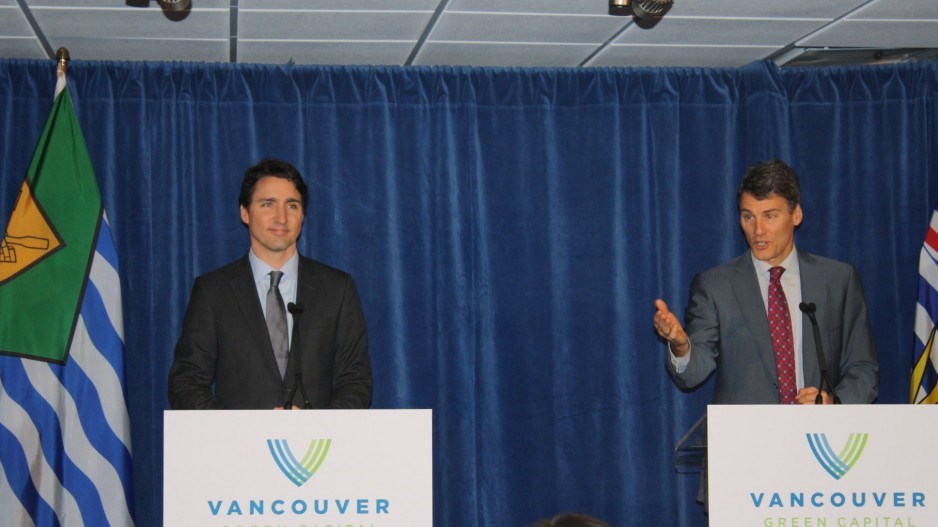Municipal governments have a new willing partner in Ottawa to help them address issues such as affordable housing and public transit, and First Nations have a federal government that appears willing to involve them more in important economic development decisions.
That was the consensus of two local leaders – Vancouver Mayor Gregor Robertson and Squamish Chief Ian Campbell – during a visit by Prime Minister Justin Trudeau to Vancouver city hall December 17.
“Vancouver – like cities across the country – now have a partner in the federal government on issues of housing, on issues of public transit, specifically,” Trudeau said during a press conference.
Robertson cited an announcement one day before Trudeau’s visit by Fisheries and Coast Guard Minister Hunter Tootoo on the planned reopening of the Kitsilano Coast Guard station – closed in 2013 – as one example of the new attitude of cooperation coming out of Ottawa.
The mayor said it was “so refreshing to have a partner in Ottawa that treats cities with respect and recognizes that we are so vital to the country’s success.”
Robertson said he and Trudeau have discussed a number of federal-municipal issues of mutual concern, including climate change strategies, public transit projects, affordable housing and investment in infrastructure.
Trudeau said his own priorities “resonate and are similar to the priorities the people of Vancouver have put forward,” which may explain why he chose Vancouver for his first city hall visit as prime minister.
One of those priorities is developing a legal marijuana trade. Despite being only quasi-legal, medical marijuana dispensaries have popped up all over Vancouver, which has forced the city to try to regulate it at the local level.
“We’ve had to undertake regulation of the dispensaries because there were no thoughtful controls coming from Ottawa historically,” Robertson said.
Trudeau has pledged to legalize marijuana, which could provide new business opportunities. He said his government’s plan to legalize weed is based in part on the fact that, unregulated, it is too easy for young people to buy.
“At the same time, we need to remove a significant revenue stream from criminal organizations and street gangs,” he said.
He said the criminal code will need to be amended, and added municipalities and provincial governments will have to play a role in regulating a legal marijuana industry.
One of the biggest impediments to industry in B.C. – from mines and pipelines to the B.C. government’s own Site C dam – is the issue of aboriginal rights and title, which has resulted in court dockets filling up with title claims and injunctions filed against projects by First Nations.
Campbell, who was among the First Nations leaders greeting Trudeau Thursday at city hall, told Business in Vancouver that First Nations leaders believe the new Liberal government is committed to addressing some of the outstanding issues around aboriginal rights and title.
“We certainly are optimistic that the prime minister has made commitments to review previous legislation that was passed by the previous government that may not be up to speed where current case law is around rights and title,” Campbell said.
He added First Nations still have concerns with National Energy Board processes with respect to involving First Nations on more of a government-to-government basis.
He said First Nations themselves would prefer to work with the federal government to resolve their issues rather than go to court.
“We don’t want to keep taking the path of most resistance around legal court challenges, where First Nations certainly have been achieving success around redefining the relationship. We can do better than that as a society.”




